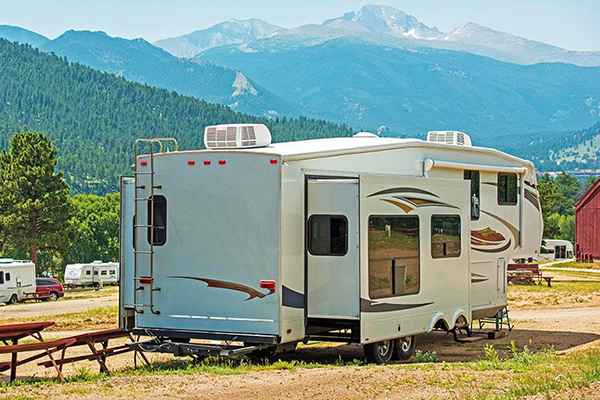
How Much Does a 5th Wheel Weigh on Average?
As we all know, trailers come in many different shapes and sizes. If you’re looking for a trailer that will suit all your needs, you’ll have to arm yourself with as much patience as you can muster. The main problem usually lies within the 5th wheel. Mainly, should you purchase a 5th wheeler, or will it end up being more of a burden than you’d hoped for?
Well, don’t worry, we’re here to help! If you decide to go for a fifth wheel trailer, then there are just a few questions you will need to look into. After that, you can enjoy your trailer to the fullest!
But, before we get into any specifics, you should get acquainted with some basic facts about the average 5th wheel trailer weight.
First of all, 5th wheels come in a wide variety of different weights. The lightest ones weigh around 2,400 lbs, while the heaviest weigh up to 20,000 lbs. However, the average weight of a 5th wheel trailer is between 12,000 lbs and 15,000 lbs.
Depending on the size and the weight of the trailer, 5th wheels can be lightweight, mid-size and full-size.
Now, let’s take a look at how much a 5th wheel trailer can weigh, as well as some other important questions regarding this champion-class trailer.
How much does a 5th wheel weigh?

There are several different categories of 5th wheelers, and as we’ve previously mentioned, each one has a different size and weight. In general, 5th wheels can be divided into three categories according to their weight and length:
- Lightweight 5th wheels
- Mid-size 5th wheels
- Full-size/luxury 5th wheels
The average lightweight 5th wheel is 21–34 ft, long and weighs 7,000–9,500 lbs. These 5th wheels can be pulled by half-ton pickup trucks.
As for a mid-size 5th wheel, these trailers are usually 33–41 ft long, and can weigh 10,000–14,000 lbs. They can be towed by a one-ton truck.
Finally, a full-size 5th wheel is anywhere from 35' to 45' long and can weigh 11,000–20,000 lbs. They can be towed by at least a one-ton truck.
Before you select a 5th wheel trailer, you need to consider the weight of your vehicle, as well as how many passengers and cargo you’re planning on carrying with you. Obviously, if you plan on using it for some light traveling on your own, there’s no need to purchase a full-size trailer.
On the other hand, if you would like to spend as much time on the road as possible, your trailer will be like your second home. You need one that’s spacious and comfortable. In that case, a full-size 5th wheel is a perfect choice.
24' 5th wheel weight
This 5th wheel falls under the lightweight category. However, since the average 5th wheel weight for this category is, in fact, 7,000 lbs at the lightest, a 24' 5th wheel actually falls into the ultra light category. If you’re interested in purchasing a 24' 5th wheel, you’ll be looking at an average weight of around 5,200 lbs. That’s the Unloaded Vehicle Weight (UVW).
27' 5th wheel weight
A 27' 5th wheel falls under the same category as the previous one. However, it weighs significantly more than the 24' 5th wheel, coming in at 6,030 lbs, without gear and water.
30' 5th wheel weight
Depending on the model, a 30' fifth wheel can weigh up to 9,500 lbs, without gear and water.
32' 5th wheel weight
A 32' 5th wheel is still in the lightweight category, but it’s on the verge of being in the mid-weight one. These 5th wheels have an Unloaded Vehicle Weight of up to 9,500 lbs.
35' 5th wheel weight
Finally, a 35' 5th wheel falls into the full-size category, coming in at an average of 11,000 lbs. Of course, as we’ve mentioned before, full-size fifth wheels can weigh anywhere from 11,000–20,000 lbs.
Understanding UVW, CCC, GAWR, and GVRW
Anyone with a 5th wheel needs to know what UVW, CCC, GAWR, and GVRW refer to.
- UVW
The UVW is the Unloaded Vehicle Weight, which refers to the weight of the RV upon delivery from the manufacturer. This includes the hitch weight, the unit’s axles, and a full LP propane tank. - CCC
CCC, or Cargo Carrying Capacity, refers to the amount of weight authorized for cargo, accessories, water, equipment, etc. - GAWR
The GAWR, or Gross Axle Weight Rating is the maximum weight, including all cargo, that can be safely supported by the axles of the unit. - GVRW
GVRW, or Gross Vehicle Weight Ratio, includes the weight of the hitch and the total weight of the carrying capacity of the vehicle. This includes passengers and any cargo inside the vehicle.
5th wheel hitch weight vs payload
The payload refers to all the extra stuff inside your vehicle. This includes passengers, cargo, accessories, pets, etc. Overall, you need to remember that a vehicle’s payload capacity is significantly lower than its towing capacity.
As for the hitch weight, there are five hitch classes, and each of them comes with their own guidelines.
- Class 1 hitches can carry up to 2,000 lbs, including 200 lbs of tongue weight.
- Class 2 hitches can carry up to 3,500 lbs and 300 lbs of tongue weight.
- Class 3 hitches can carry up to 6,000 lbs and 600 lbs of tongue weight.
- Class 4 hitches can carry up to 10,000 lbs and 1,000 lbs tongue weight.
- Class 5 hitches can carry up to 12,000 lbs and 1,700 lbs of tongue weight.
In order to determine how much payload you can afford, you need to know the GVRW and UVW of your vehicle.
How much does a 5th wheel hitch weigh?

The most commonly used hitches are standard, slider, and gooseneck hitches. The standard hitch is usually used for full-sized 5th wheels, meaning it can pull up to 20,000 lbs. The slider hitch is mostly used for short-bed trucks, and the gooseneck is used for 5th wheelers with cargo in the trunk.
For all 5th wheelers, the average weight of a hitch is 75–200 lbs.
How to calculate 5th wheel tongue weight
If you’re not sure how to calculate the 5th wheel tongue weight, don’t worry. There is an easy way to do this. Overall, the tongue weight should be approximately 10–15% of the total weight of your loaded trailer. Furthermore, the tongue weight needs to be accounted for in the tow vehicle’s payload capacity.
This additional weight should never exceed the GVWR when you add in the weight of the passengers, cargo, and anything else inside.
5th wheel weight distribution
In order to place more weight on the steers, you need to move the 5th wheel towards them. Furthermore, if you would like to remove weight from the steers, you should slide the 5th wheel back.
Making adjustments to the 5th wheel helps move more weight than if you were to move the trailer axle.
However, if it’s not possible to adjust the weight distribution, then your only option is to remove pieces from the trailer.
How to weigh a 5th wheel trailer

The simplest way to weigh your 5th wheel is to weigh it at a truck stop. You need to make sure to weigh it while it is fully loaded. Your owners manual will give you the exact GVWR of the vehicle, and you should make sure that that weight is not exceeded.
Does a fifth wheel increase towing capacity?
Basically, the towing capacity of your vehicle is stated in your owner’s manual, and that is the maximum towing capacity. It’s the hitch that determines the overall towing capacity.
How much does a Montana 5th wheel weigh?
A Montana 5th wheel with a length of 35' weighs 12,030 lbs, has a payload capacity of 4,320 lbs, and a GVWR of 16,350 lbs. As for the hitch, it weighs 2,400 lbs.
Jayco 5th wheel weight
The Jayco Eagle 5th wheel with a length of 29,5' weighs 7,530 lbs.
Scamp 5th wheel weight
A 19' Scamp 5th wheel with a length of 19' can weigh from 2400–2900 lbs and has a hitch weight of 400 lbs.
Alpenlite 5th wheel weight
An Alpenite 28' 5th wheel has a standard weight of approximately 7,000 lbs.
How much 5th wheel weight can I tow?

If you would like to ensure that you tow your fifth wheel as safely as possible, you need to know just how much weight you can tow. For this, you need to check your truck’s tow rating, as well as the hitch weight. This way you’ll determine whether your fifth wheel is the right weight for you to be able to tow it safely.
For reference, the total towing capacity should include the unloaded weight of the 5th wheel, the weight of the cargo, and the weight of passengers.
Max 5th Wheel Weight for Ram 2500
A Ram 2500 has the amazing towing capacity of 17,980 lbs.
Max 5th wheel weight for F-250

An F-250 has the towing capacity of 12,000–14,000 lbs. 12,000 lbs refer to standard cab pickups, while 14,000 lbs refer to Super Cab and crew cab models.
However, the F-250 can tow an additional 2,200 lbs using a fifth wheel trailer, giving it a total towing capacity of 16,200 lbs.
Rules and regulations regarding size limitations
Always remember to check state requirements regarding the length limits of 5th wheel trailers. It’s always best to play it safe rather than risk getting a fine. What’s more, if you’re planning on making reservations at a campsite, you should always check whether you’re within the required size limit, or else you won’t be able to stay there.
The conclusion
Overall, if you’re interested in buying a quality 5th wheel trailer, then you need to take the time to find one that will meet all your needs. Once you do, you need to check all the specifications regarding the UVW, CCC, GAWR, and GVRW.
We’ve given you a brief overview of some of the most important things you need to consider before purchasing your first 5th wheel trailer.
Now it’s up to you to see what catches your eye, and once you buy it, you can fully enjoy your life on the open road!

